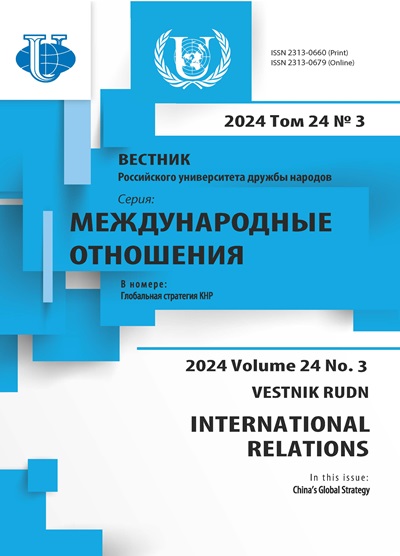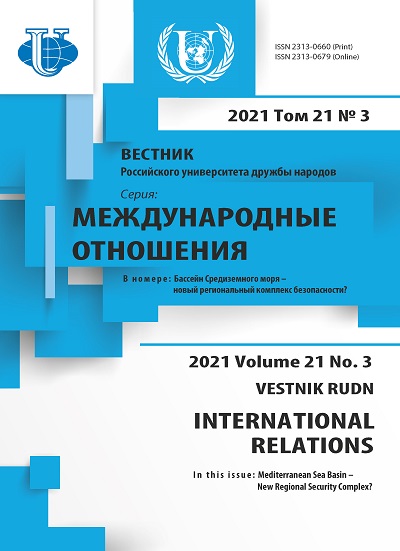Вступление Турции в Европейский союз: «Имеет ли религия значение?»
- Авторы: Арьял С.К.1, Наир А.1, Бхаттараи Г.2
-
Учреждения:
- Варшавский университет
- Университет Трибхуван
- Выпуск: Том 21, № 3 (2021): Бассейн Средиземного моря – новый региональный комплекс безопасности?
- Страницы: 571-582
- Раздел: ДВУСТОРОННИЕ ОТНОШЕНИЯ
- URL: https://journals.rudn.ru/international-relations/article/view/27451
- DOI: https://doi.org/10.22363/2313-0660-2021-21-3-571-582
Цитировать
Полный текст
Аннотация
На фоне растущего страха Европы перед исламизацией и обострения исламистских настроений в Турции религия по-прежнему представляет собой важнейший фактор в контексте интеграции Анкары в Европейский союз (ЕС). После длительного ожидания и непрерывных переговоров Турция все больше отдаляется от перспективы быть принятой в ряды ЕС. Выявляется роль религии в неослабевающих трениях между двумя регионами / субъектами и обосновывается тезис, что религию следует рассматривать в качестве одной из переменных европейской интеграции. Анализ опирается на первичные и вторичные источники с обращением к реалистско-ориентированному «Столкновению цивилизаций» Сэмюэля Хантингтона. Для лучшего понимания динамики политических процессов в Турции использовались турецкие источники. С точки зрения методологического подхода исследование проводилось посредством контент-анализа и наблюдения за социально-политическими сценариями и поведенческими изменениями ЕС и Турции. В заключении сделан вывод, что надлежащий механизм для рассмотрения религии в качестве переменной отсутствует. Вместе с тем религия по-прежнему играет важную психологическую роль как в ЕС, так и в Турции. Выдвинута рекомендация по проработке Брюсселем и Анкарой религиозного измерения интеграции в контексте общей интеграционной динамики.
Ключевые слова
Об авторах
Сародж Кумар Арьял
Варшавский университет
Автор, ответственный за переписку.
Email: sk.aryal@uw.edu.pl
ORCID iD: 0000-0001-5094-3590
аспирант Школы социальных наук
Варшава, ПольшаАдитьян Наир
Варшавский университет
Email: a.nair2@student.uw.edu.pl
ORCID iD: 0000-0002-8542-4851
магистрант
Варшава, ПольшаГаурав Бхаттараи
Университет Трибхуван
Email: gaurav.bhattarai@dird.tu.edu.np
ORCID iD: 0000-0003-1471-5763
доцент кафедры международных отношений и дипломатии
Катманду, НепалСписок литературы
- Aydin-Düzgit, S. (2009). Constructing Europe through Turkey: French perceptions on Turkey’s accession to the European Union. Politique Européenne, 3(29), 47-82. https://doi.org/10.3917/poeu.029.0047
- Bangstad, S. (2014). Anders Breivik and the rise of Islamophobia. London: Zed books.
- Çavdar, G. (2006). Islamist “New Thinking” in Turkey: A model for political learning? Political Science Quarterly, 121(3), 477-497.
- Dagi, I. (2008). Islamist parties and democracy: Turkey’s AKP in power. Journal of Democracy, 19(3), 25-30. https://doi.org/10.1353/jod.0.0015
- De Vreese, C. H., Boomgaarden, H. G., & Semetko, H. A. (2011). (In)direct framing effects: The effects of news media framing on public support for Turkish membership in the European Union. Communication Research, 38(2), 179-205. https://doi.org/10.1177/0093650210384934
- Font, N. (2006). Why the European Union gave Turkey the green light. Journal of Contemporary European Studies, 14(2), 197-212. https://doi.org/10.1080/14782800600892259
- Foret, F. (2015). Religion and politics in the European Union: The secular canopy. Cambridge: Cambridge University Press.
- Fox, J. (2001). Religion as an overlooked element of International Relations. International Studies Review, 3(3), 53-73.
- Fox, J. (2002). Ethnoreligious conflict in the late twentieth century. Lanham: Lexington Books.
- Fox, J. (2008). State religious exclusivity and human rights. Political Studies, 56(4), 928-948. https://doi.org/10.1111/j.1467-9248.2008.00724.x
- Hale, W. (2000). Turkish foreign policy, 1774-2000. Cambridge: Cambridge University Press
- Haynes, J. (2007). An introduction to International Relations and religions. 1st edition. Harlow: Pearson Education
- Huntington, S. P. (1993). The clash of civilizations? Foreign Affairs, 72(3), 22-49. https://doi.org/10.2307/20045621
- Huntington, S. P. (1996). Clash of the civilizations and the remaking of world order. New York: Simon & Schuster.
- Hurd, E.S. (2006). Negotiating Europe: The politics of religion and the prospects for Turkish accession. Review of International Studies, 32(3), 401-418. https://doi.org/10.1017/S026021050600708X
- Jung, D., & Rauvere, C. (2008). Religion, politics and Turkey’s EU accession. London: Palgrave Macmillan.
- Kaiser, W. (2007). Christian democracy and the origins of European Union. Cambridge: Cambridge University Press.
- Kandiyoti, D., & Emanet, Z. (2017). Education as a battleground: The capture of minds in Turkey. Globalizations, 14(6), 869-876. https://doi.org/10.1080/14747731.2017.1325170
- Kedikli, U., & Akça, M. (2018). Rising Islamophobic discourses in Europe and fight against Islamophobia on the basis of international organizations. Mediterranean Journal of Social Sciences, 9(1), 9-23. https://doi.org/10.2478/mjss-2018-0001
- Kubicek, P. (2005). Turkish accession to the European Union: Challenges and opportunities. World Affairs, 168(2), 67-78
- Lucas, M. H. (2011). Understanding the French ban on the veil. Economic and Political Weekly, 46(18), 25-27
- Madeley, J. (2010) E Unum Pluribus: The role of religion in the project of European integration. In J. Haynes (Ed.), Religion and politics in Europe, the Middle East and North Africa (pp. 114-135). London: Routledge
- Modebadze, V., & Mehmet, F. (2015). Why Turkey should join the European Union: Arguments in favor of Turkish membership. Journal of Liberty and International Affairs, 1(2), 1-9
- Nasr, S. V. R. (2005). The rise of “Muslim democracy”. Journal of Democracy, 16(2), 13-27. https://doi.org/10.1353/jod.2005.0032
- Neuwahlm, N. (1999). The EU - Turkey Customs Union: A balance, but no equilibrium. European Foreign Affairs Review, 4(1), 37-62
- Öztürk, A. E. (2016). Turkey’s Diyanet under AKP rule: From protector to imposer of state ideology? Journal of Southeast European and Black Sea Studies, 16(4), 619-635. https://doi.org/10.1080/14683857.2016.1233663
- Sezgin, Z. (2019). Islam and Muslim minorities in Austria: historical context and current challenges of integration. International Migration & Integration, 20, 869-886. https://doi.org/10.1007/s12134-018-0636-3
- Sheikh, M. (2012). How does religion matter? Pathways to religion in International Relations. Review of International Studies, 38(2), 365-392.
- Sunar, L. (2017). The long history of Islam as a collective “Other” of the West and the rise of Islamophobia in the U.S. after Trump. Insight Turkey, 19(3), 35-52. https://doi.org/10.25253/99.2017193.03
- Thomas, S. (2000). Religion and international conflict. In K. Dark (Ed.), Religion and International Relations (pp. 1-23). London: Macmillan.
- Thomas, S. (2005). The global resurgence of religion and the transformation of International Relations. The struggle for the soul of the twenty-first century. New York: Palgrave Macmillan.
- Tibi, B. (2006). Europeanizing Islam or the Islamization of Europe: Political democracy vs. cultural difference. In T. A. Byrnes & P. J. Katzenstein (Eds.), Religion in an expanding Europe (pp. 204-224). Cambridge: Cambridge University Press. https://doi.org/10.1017/CBO9780511491917.009
- Turunc, H. (2007). Islamicist or democratic? The AKP’s search for identity in Turkish politics. Journal of Contemporary European Studies, 15(1), 79-91. https://doi.org/10.1080/14782800701273417
- Waschinski, G. (2007). Gott in die Verfassung?: Religion und Kompatibilität in der Europäischen Union. Baden-Baden: Nomos.
- Yilmaz, I. (2014). Religious freedom, the Muslim identity and the secularist social-engineering project in Turkey. Quaderni di Diritto e Politica Ecclesiastica, (1), 197-204.
- Yilmaz, I., & Bashirov, G. (2018). The AKP after 15 years: Emergence of Erdoganism in Turkey. Third World Quarterly, 39(9), 1812-1830. https://doi.org/10.1080/01436597.2018.1447371











